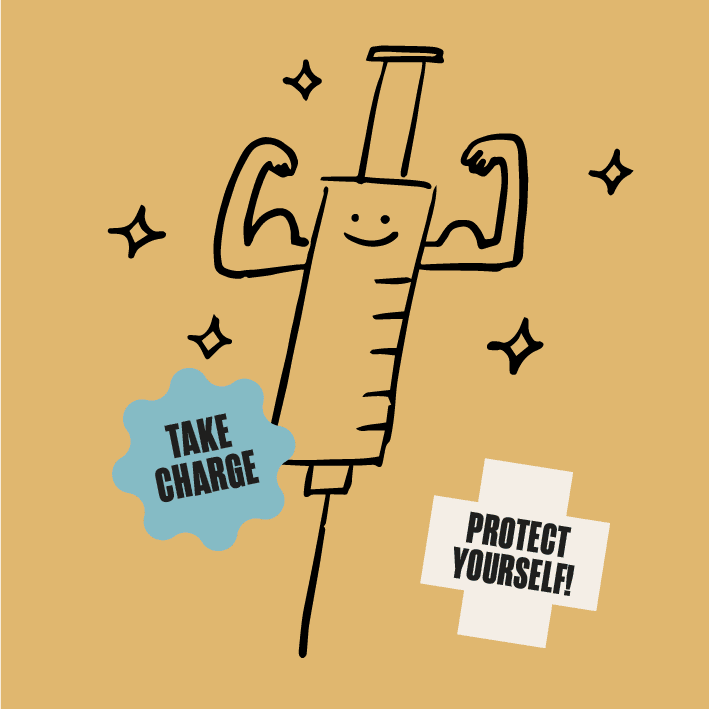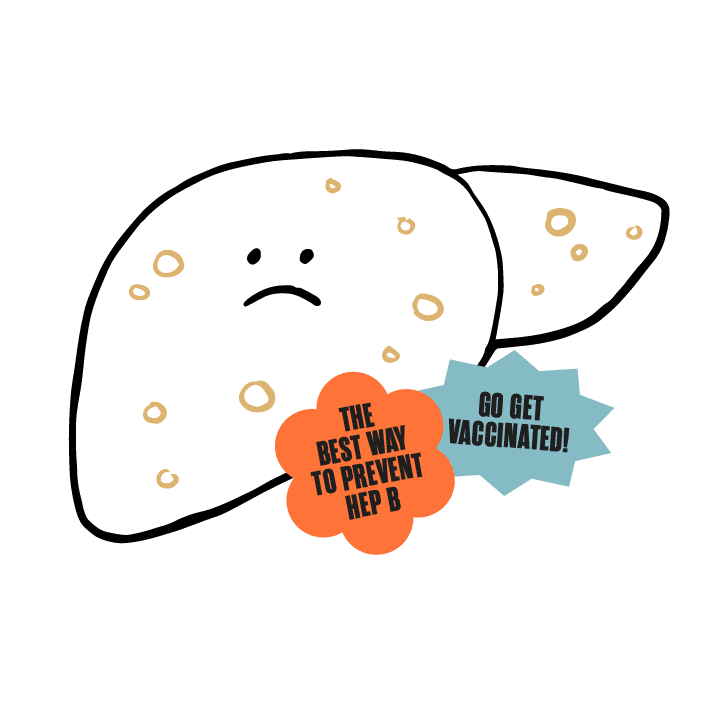A guide to
Vaccines that Prevent Cancer
Two shots can prevent you from getting seven different types of cancer. Why wouldn’t you take them?
Two shots can prevent you from getting seven different types of cancer. Why wouldn’t you take them?

HPV stands for Human Papillomavirus. There are different strains of HPV, some that cause cancer and some that cause genital warts.

HPV causes six different types of cancer including 90% of cervical cancers, as well as cancers of the vulva, vagina, penis, anus, and oropharynx (back of the throat).
Unfortunately, 8 out of 10 sexually active people who are unvaccinated will contract HPV at some point in their lifetimes. HPV is very easily transmitted between people because there are few signs or symptoms. The best way to protect yourself against HPV is by getting the HPV vaccine.
The earlier you get the vaccine, the more you’re protected.
The HPV vaccine protects you from contracting the cancer-causing strains of HPV in the first place.
Not sure how to talk to your parents about the HPV vaccine? We’ve got you covered. Learn more here.
The HPV vaccine can prevent 90% of HPV-associated cancers and it has a 15+ year safety record.
Ready for a trivia fact? The HPV vaccine is for everyone, literally. Everyone ages 9-26 can and should get vaccinated, but the earlier you get the HPV vaccine the more effective it is at preventing cancer. So, we suggest you get any young people in your life vaccinated between ages 9-13, or get yourself vaccinated if you were not as a child.
You can get the HPV vaccine from your doctor, or if you’re scheduling the HPV vaccine for your child, they can get it at their routine physical. There are two shots to complete the HPV vaccine, so make sure you make a follow up appointment six months after your first shot.
The HPV vaccine is available to you free of charge. All insurance plans under the Affordable Care Act (ACA) cover the cost of the HPV vaccine. Vaccines for Children (VFC) will also cover the cost of the vaccine for children up to age 19 who are Medicaid-eligible, uninsured, underinsured, or American Indian or Alaska Native.
Anyone with a cervix still needs to get routine cervical cancer screenings (HPV test and/or Pap smears) regardless of if they have gotten the HPV vaccine.
From HPV only impacting women, to sex being the only way to get HPV, there’s a bunch of hot takes out there. Get the truth on what’s real and what’s not when it comes to HPV and the HPV vaccine.

Myth: Only girls get HPV, so boys don’t need to get the vaccine.
Reality is: HPV doesn’t discriminate. No matter the body you have, HPV is passed and contracted the same way. Because anyone can get HPV, everyone should get the HPV vaccine. The HPV vaccine is approved, safe, and recommended for both boys and girls.
Fast fact: Everyone can, and should, get the HPV vaccine.
Myth: I got the HPV vaccine, so I don’t need to get Pap and/or HPV tests.
Reality is: Even if you get the HPV vaccine, you still need to get regular Pap and/or HPV tests to screen for cervical cancer. While the HPV vaccine protects against HPV-associated cervical cancer, it is still possible to develop cervical cancer that isn’t connected to an HPV infection. Routine cervical cancer screenings will help catch any cancerous cells early while they’re easier to treat.
Fast fact: Even if you’re vaccinated, you still need to get routine cervical cancer screenings if you have a cervix.
Myth: My health insurance does not cover the HPV vaccine OR I don’t have insurance so I can’t afford the HPV vaccine.
Reality is: All insurance plans under the Affordable Care Act (ACA) and state-funded programs are required by law to cover the cost of the HPV vaccine, so it is available to you free of charge. If you are uninsured and under 19 years old, Medicaid-eligible, uninsured, underinsured, and/or American Indian or Alaska Native, you can also get the HPV vaccine free of charge through the Vaccines for Children (VFC) program.
Fast fact: There are programs available to help pay for the HPV vaccine.
Myth: If you don’t have sex, you can’t get HPV.
Reality is: Depends how you’re defining “sex.” HPV is spread through skin-to-skin contact, including oral, anal, and vaginal sex. While condoms can lower your risk of contracting HPV, you can still contract the virus through protected sex if there’s other skin-to-skin contact (spoiler alert: there probably is!). You can also get HPV from other forms of sexual contact other than intercourse, like fingering/touching, touching multiple body parts during sex, or by sharing sex toys with a partner.
Fast fact: HPV is contracted through intimate skin-to-skin contact.
Myth: The HPV vaccine causes negative side effects.
Reality is: The Centers for Disease Control and Prevention (CDC) has found no proof that the HPV vaccine causes significant negative side effects. Like other vaccines, you may experience temporary side effects like pain, redness, and/or swelling at the site of the shot. In very rare cases, you may have an allergic reaction. If you are concerned about side effects, speak with your doctor before getting the HPV vaccine.
Fast fact: HPV vaccine side effects are minor and similar to other vaccines.
Myth: The HPV vaccine contains harmful ingredients.
Reality is: Some people are worried about the ingredients that are used to make vaccines, including aluminum. While there is aluminum in the HPV vaccine, it’s a very small and safe amount. Aluminum-containing vaccines have been used for years and in over one billion people. Every day, babies, children and adults come into contact with more aluminum through food, water, and even breast milk than the amount of aluminum in the HPV vaccine.
Fast fact: There is no need to be worried about the HPV vaccine’s ingredients.
Myth: The HPV vaccine causes fertility problems.
Reality is: Research has found that the HPV vaccine does not cause fertility problems. In fact, the HPV vaccine can help protect against future fertility problems that are linked to cervical cancer by preventing you from ever getting cervical cancer.
Fast fact: The HPV vaccine can actually protect you from future fertility problems.
Myth: Getting the HPV vaccine is an invitation to having sex.
Reality is: Getting the HPV vaccine does not lead to changes in sexual behavior. Contrary to common belief, research has found that HPV vaccination during young adolescence is not associated with an earlier onset of sexual activity or an increase in sexual activity.
Fast fact: Getting vaccinated against HPV does not lead to them having sex at a younger age.
Myth: Vaccines could be associated with premature ovarian failure (POF), aka premature menopause.
Reality is: Research by the American Academy of Pediatricians has found that “there is no strong evidence of a causal relationship between HPV4 and ovarian dysfunction.” In other words, getting the HPV vaccine will not cause premature menopause.
Fast fact: The HPV vaccine is not associated with POF.

Hepatitis B (aka Hep B) is a serious disease that affects the liver. Over time, Hep B can cause long-term inflammation that can lead to liver cancer. Many people with Hepatitis B don’t know they have it because they don’t feel or look sick. Due to this, Hepatitis B is easily spread unless people are vaccinated. The best way to prevent Hepatitis B is to get vaccinated against it.
Talk to your doctor or local health department about getting the Hep B vaccine. Some clinics offer free or low-cost vaccinations.

See what cancers you should check for with our helpful quick calculator.
Cancer Screening CalculatorCancer is hard. Visit our library to help navigate cancer’s impact on your heart, body, soul, and everything in between.